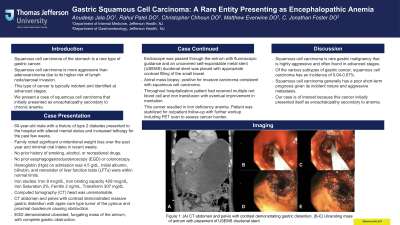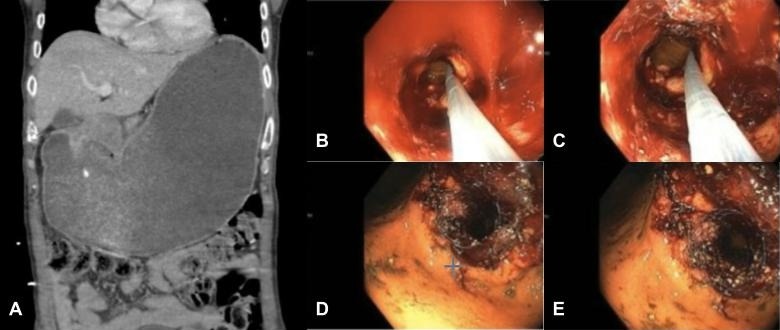Monday Poster Session
Category: Stomach
P3401 - Gastric Squamous Cell Carcinoma a Rare Entity Presenting as Encephalopathic Anemia
Monday, October 28, 2024
10:30 AM - 4:00 PM ET
Location: Exhibit Hall E

Has Audio

Anudeep Jala, DO
Jefferson Health
Washington Township, NJ
Presenting Author(s)
Anudeep Jala, DO1, Rahul Patel, DO1, Christopher Chhoun, DO1, Matthew Everwine, DO1, C. Jonathan Foster, DO2
1Jefferson Health, Washington Township, NJ; 2Jefferson Health, Cherry Hill, NJ
Introduction: Squamous cell carcinoma of the stomach is a rare type of gastric cancer. It is more aggressive than adenocarcinoma due to its higher risk of lymph node/serosal invasion and often presents in advanced stages. We present a case of squamous cell carcinoma in a patient who initially presented with encephalopathy.
Case Description/Methods: A 60-year-old male with a past medical history of type 2 diabetes presented to the hospital for concern of altered mental status and increasing lethargy for the past few weeks. Family noted significant weight loss over the past year and minimal oral intake in recent weeks. He has no prior history of smoking, alcohol, or recreational drugs. No prior esophagogastroduodenoscopy (EGD) or colonoscopy was conducted. Hemoglobin on admission was 4.5 g/dL. Initial albumin, bilirubin and remainder of liver function tests (LFTs) were within normal limits. Computed tomography (CT) head was unremarkable. CT abdomen and pelvis with contrast demonstrated massive gastric distention with apple core type tumor of the pylorus and proximal duodenum causing obstruction.
Patient underwent EGD which demonstrated an ulcerated, fungating mass of the antrum, resulting in complete gastric obstruction. The scope was then passed through the antrum with fluoroscopic guidance and an uncovered self-expandable metal stent (USEMS) duodenal stent was placed with appropriate contrast filling of the small bowel. Antral mass biopsy had returned as invasive carcinoma consistent with squamous cell carcinoma. As the patient received subsequent red blood cell and iron transfusions his mentation had improved. This carcinoma had likely resulted in indolent and chronic iron deficiency anemia. Our patient was deemed stable for outpatient follow-up with Hematology/Oncology for outpatient PET-CT scan to assess burden of disease.
Discussion: Squamous cell carcinoma is a rare gastric malignancy that is aggressive and often found in advanced stages. Of the various subtypes of gastric cancer, squamous cell carcinoma has an incidence of 0.04-0.07%. Prompt identification of the cancer can guide chemotherapy and surgical interventions. Our case is unique as this rare cancer presented itself initially as encephalopathy secondary to anemia. Unfortunately, given its indolent nature and aggressive metastasis, squamous cell carcinoma generally has poor short-term prognosis.

Disclosures:
Anudeep Jala, DO1, Rahul Patel, DO1, Christopher Chhoun, DO1, Matthew Everwine, DO1, C. Jonathan Foster, DO2. P3401 - Gastric Squamous Cell Carcinoma a Rare Entity Presenting as Encephalopathic Anemia, ACG 2024 Annual Scientific Meeting Abstracts. Philadelphia, PA: American College of Gastroenterology.
1Jefferson Health, Washington Township, NJ; 2Jefferson Health, Cherry Hill, NJ
Introduction: Squamous cell carcinoma of the stomach is a rare type of gastric cancer. It is more aggressive than adenocarcinoma due to its higher risk of lymph node/serosal invasion and often presents in advanced stages. We present a case of squamous cell carcinoma in a patient who initially presented with encephalopathy.
Case Description/Methods: A 60-year-old male with a past medical history of type 2 diabetes presented to the hospital for concern of altered mental status and increasing lethargy for the past few weeks. Family noted significant weight loss over the past year and minimal oral intake in recent weeks. He has no prior history of smoking, alcohol, or recreational drugs. No prior esophagogastroduodenoscopy (EGD) or colonoscopy was conducted. Hemoglobin on admission was 4.5 g/dL. Initial albumin, bilirubin and remainder of liver function tests (LFTs) were within normal limits. Computed tomography (CT) head was unremarkable. CT abdomen and pelvis with contrast demonstrated massive gastric distention with apple core type tumor of the pylorus and proximal duodenum causing obstruction.
Patient underwent EGD which demonstrated an ulcerated, fungating mass of the antrum, resulting in complete gastric obstruction. The scope was then passed through the antrum with fluoroscopic guidance and an uncovered self-expandable metal stent (USEMS) duodenal stent was placed with appropriate contrast filling of the small bowel. Antral mass biopsy had returned as invasive carcinoma consistent with squamous cell carcinoma. As the patient received subsequent red blood cell and iron transfusions his mentation had improved. This carcinoma had likely resulted in indolent and chronic iron deficiency anemia. Our patient was deemed stable for outpatient follow-up with Hematology/Oncology for outpatient PET-CT scan to assess burden of disease.
Discussion: Squamous cell carcinoma is a rare gastric malignancy that is aggressive and often found in advanced stages. Of the various subtypes of gastric cancer, squamous cell carcinoma has an incidence of 0.04-0.07%. Prompt identification of the cancer can guide chemotherapy and surgical interventions. Our case is unique as this rare cancer presented itself initially as encephalopathy secondary to anemia. Unfortunately, given its indolent nature and aggressive metastasis, squamous cell carcinoma generally has poor short-term prognosis.

Figure: Image 1: (A) CT abdomen and pelvis with contrast demonstrating gastric distention, (B-E) Ulcerating mass of antrum with placement of USEMS duodenal stent
Disclosures:
Anudeep Jala indicated no relevant financial relationships.
Rahul Patel indicated no relevant financial relationships.
Christopher Chhoun indicated no relevant financial relationships.
Matthew Everwine indicated no relevant financial relationships.
C. Jonathan Foster: Conmed – Consultant. Steris – Consultant.
Anudeep Jala, DO1, Rahul Patel, DO1, Christopher Chhoun, DO1, Matthew Everwine, DO1, C. Jonathan Foster, DO2. P3401 - Gastric Squamous Cell Carcinoma a Rare Entity Presenting as Encephalopathic Anemia, ACG 2024 Annual Scientific Meeting Abstracts. Philadelphia, PA: American College of Gastroenterology.
